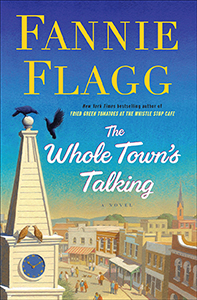ABOUT BOOKS
By Joan Bauer
When I read a Fannie Flagg book, I feel like I’m walking down a road with a good friend, and I’m never sure where we’re going to end up. Among Flagg’s talents is how she can size up a character in a few perfect words. Early in The Whole Town’s Talking, her tenth novel, there is this:
Swedish Man of 37 Years Looking For
Swedish Lady For Marriage.
I Have a House and Cows.
— Lordor Nordstrom
Swede Town, Missouri
Lest you think that Lordor Nordstrom is a man devoid of a rich inner life, do keep reading. At age thirty-seven, this bachelor farmer was thinking about his future on earth and beyond. Finding a wife wasn’t easy, neither was finding a suitable resting place for a family he was yet to have, but being a forward thinker, he thought deep about both situations and ended up with a pretty mail-order bride and ten burial plots on a hill that would be called Still Meadows.
Children followed the blessed union. Soon Lordor had enough success that he could help others, but not so much that it went to his head. He came to transformation (“you either love cows, or you don’t”), fortunately for him his wife Katrina was a good sport and a cultured cow woman. Lordor had dreams for his little town of Elmwood Springs; he became the mayor for a while and lived a contented life. It was one surprise after another for him; mostly he didn’t think he was worthy of his wife, his beautiful children, or his success.

It’s a nice touch to learn of Lordor and his family spanning early 20th-century history—attending the St. Louis World Fair, voting for women’s rights at the Democratic National Convention in 1916, hearing news over the telegraph of some kooky brothers called Wright flying a car with wings up in the air. But nothing surprised Lordor quite so much in life like it had in death. For when they put him to rest in the Elmwood Springs Cemetery, after a time, well… he woke up. And Fannie Flagg takes us back and forth through the generations from birth to loss to death and to Still Meadows where it’s getting less and less still as the deceased of Elmwood Springs are having a high old time. There’s a lot more to being dead than you might think, the author tells us.
But the good people down below who are still alive just have the sense sometimes that they’re being watched. And the dead people on the hill just have the feeling that it’s good to be watching their loved ones even though they don’t agree with everything they’re doing and sometimes would like to give them a swift kick in the butt. Through letters, personal ads, newspaper columns, and narrative, Flagg draws her immigrant families with a light touch and blesses them with notable courage. She takes us from 1889 to 2016 and bounces briefly into 2021. We feel the winds of change and the shock of world events.
While The Whole Town’s Talking isn’t as funny or as tightly constructed as Fried Green Tomatoes at the Whistle Stop Cafe, this novel has the kind of heart that can take you a long way. It’s a gentle, wacky ride, a reminder to us all of the ones who came before, the ones we wished were still here and could offer advice or a nod of pride to cheer us on. It’s good to think about the links to generations, what they might be thinking, and their hopes for us that stretched across the miles and the years. It’s good to think of greatness born in simple, committed people who saw war, early death, colossal disappointment, and hardly mentioned it. As we begin what promises to be a tumultuous new year, it’s good to slow down and read a Fannie Flagg book filled with connection, remembrance, and hope.

Joan Bauer is a New York Times bestselling novelist and winner of the Newbery Honor Award, the LA Times Book Prize, and two Christopher Awards. Her latest novel is Soar, published by Viking/Penguin Random House. Connect with her on Twitter @joan_bauer or at joanbauer.com.





